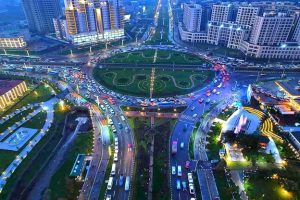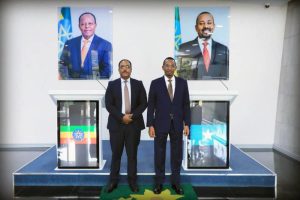Ethiopia is highly committed at present more than any time to well accomplish two meaningful national targets—effectively completing the Grand Ethiopian Renaissance Dam (GERD) and conducting a fair, free and credible national elections in June—which are strongly believed to confidently transform the nation to the next better level though amid a number of pressures from within and on the side of external powers. To this end, it is recurrently elucidated that the country is by far needed the unity and cooperation of its citizens at home and abroad.
Commissioner General, Federal Police Commission, Demelash Gebre-Michael said that comprehensive preparations have been finalized to make the upcoming elections peaceful and democratic as well as to well safeguard the Grand Ethiopian Renaissance Dam (GERD). The commission also stated that it is ready to execute its duties and responsibilities during the election neutrally.
As to the Commissioner General, the 6th National Election is given attention as the country is under political reform. According to him, the government is committed to create conducive environment for citizens to elect their representatives freely and without any pressure. He also said that federal police is working in collaboration with regional police commissioners and other concerned parties for the realization of a peaceful election.
Election related problems are going to be well dealt with as the federal police have been fortifying internal and external ties to well sieve the bottlenecks that can potentially cause instability. The attorney general and courts have also set mechanisms that only serve election related issues separately.
The election will be the first ever democratic and credible elections as a number of independent institutions such as the National Electoral Board of Ethiopia have been set up, he added. It is also believed to be the very basis aspect to primarily determine future decisions about the structure of the country. The election may offer opportunities to support political dialogue which could sustain important reforms and decrease divergence, he said.
The parties that secure significant shares in the next parliament and which go on to form the government will thus seek to advance their preferred vision of how Ethiopia’s state is organized. It is well recognized that earlier, government orchestrated harassment had led major opposition parties to embargo most ballots. Instead of offering citizens a meaningful opportunity to choose their leaders, the five elections held before in Ethiopia had served to consolidate the ruling party’s power. The 2021 process differs from the past in several ways, notably with regard to the independent National Election Board (NEBE) and the involvement of several new opposition parties.
Since the social media is increasingly accessible and popular in Ethiopia, it has to be well managed and the society has also to well sieve the fruit from the straw. In a context of inadequate digital literacy and socio-political polarization, social media platforms are anxious with disinformation and misinformation, used to disseminate hate speech, and even incite violence. This challenge is not unique to Ethiopia, but it is the first time Ethiopians must reckon with the impacts of social media in an electoral process.
It is not surprising that the June elections are the focus of considerable external attention but by itself the vote will not determine the potential for future reforms or provide meaningful legitimacy to the incumbent. The election is thus one element of Ethiopia’s political evolution and should not be treated as an end in itself.
As to Commissioner General, Ethiopian security stakeholders – both formal and informal – have increased understanding of their roles and responsibility during the electoral cycle, including their obligation to protect human rights and the right to vote. The Ethiopian electorate is informed of the importance of voting and peaceful elections.
The conduct of these events will be critical to Ethiopia’s reform trajectory. Citizens, candidates, and parties are made aware of peaceful electoral dispute resolution mechanisms – both formal and informal – and use those mechanisms, he underscored. Aregawi Berhe (Ph.D), Director General of the Office of the National Council for the Coordination of Public Participation to the Construction of the Grand Ethiopian Renaissance Dam (GERD) said all Ethiopians have to consolidate unity more than ever before as a number of foreign elements would like to take advantage of the gaps witnessed amongst us.
Over the last two years, the government has taken political and legislative reforms that may contribute to a more competitive election. For example, the electoral board which oversees the polling has been re-established as an independent institution, he added. Despite the upbeat expectations, the June elections might face serious challenges as Ethiopia’s party system is extremely volatile on the one hand and political parties are weak and fragmented on the other.
Though elections will take place amid the upheaval in Tigray, one of the country’s 10 federal regions, there are fertile grounds to do so. Firstly, several exiled opposition politicians and political parties are allowed to operate inside the country. Secondly, various independent institutions have been set up to autonomously run activities.
Thirdly, the National Electoral Board of Ethiopia is now accountable to the House of Peoples’ Representatives, the federal legislative body. And, a prominent former opposition politician and political prisoner, was appointed by the House of Peoples’ Representatives in late 2018 to lead the board and increase its credibility by all.
Fourth, the Federal Supreme Court and the Ethiopian Human Rights Commission are now led by prominent professionals. Both worked for the advancement of human rights and social justice for many years.
And a new law on civil society has made it possible for nongovernmental organizations, professional associations, and consortiums to engage in the advancement of human rights and democracy. These include civic and voter education, capacity building for political parties, human rights institutions, and courts.
The Federal Police, the Attorney General, the National Intelligence and Security Service, and the Ministry of Defense and regional representatives have been established by the government to ensure a peaceful and legitimate election, said the Commissioner General.
The government should make a clear public statement that human rights violations in the election context will not be tolerated; it should instruct the police and relevant local authorities to ensure that candidates and voters are not subjected to human rights violations, intimidation or threats on account of their peaceful opinions.
There should be no impunity for human rights violations during the elections heads of the security forces at all levels should make it clear to the forces under their command, as to the government.
In sum, the government should respect the legitimate role of human rights defenders, including those advocating for the human rights of women and engage in constructive dialogue with civil society groups promoting human rights or monitoring human rights during the elections.
Election observers are also expected to document what they observe or witness or hear of, bring them to the attention of the National Electoral Board and the federal or regional police, and make public their findings, including any failure of the authorities to take swift and effective remedial actions in accordance with the law and international standards of justice.
International and local election observers are expected to work together, share expertise, and sort out pitfalls accordingly.
In so doing, the country will conduct a fair, free, credible and demarcatic elections.
BY MENGESHA AMARE
The Ethiopian Herald June 1/2021




